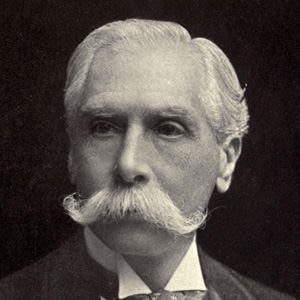
Alfred Austin
30.05.1835 - 02.06.1913
English Poet, novelist and dramatist
Alfred Austin DL (30 May 1835 – 2 June 1913) was an English poet who was appointed Poet Laureate in 1896, after an interval following the death of Tennyson, when the other candidates had either caused controversy or refused the honour. It was claimed that he was being rewarded for his support for the Conservative leader Lord Salisbury in the General Election of 1895. Austin’s poems are little-remembered today, his most popular work being prose idylls celebrating nature.
Life
Alfred Austin was born in Headingley, near Leeds, on 30 May 1835, to a Roman Catholic family. His father, Joseph Austin, was a merchant in Leeds; his mother, a sister of Joseph Locke, M.P. for Honiton. Austin was educated at Stonyhurst College (Clitheroe, Lancashire), St Mary's College, Oscott, and University of London, from which he graduated in 1853. He became a barrister in 1857 before leaving law to concentrate on literature.
Politically conservative, between 1866 and 1896 Austin edited National Review for several years, and wrote leading articles for The Standard. He was Foreign Affairs Correspondent with the Standard, and served as a special correspondent to The Ecumenical Council of the Vatican in 1870; at the Headquarters of the King of Prussia during the Franco-Prussian War, 1870; at the Congress of Berlin, 1878 where he was granted an audience by German Chancellor Otto von Bismarck. In 1883 he co-founded the National Review with W.J. Courthope and served as joint-editor until 1893 and sole editor until 1896.
On Tennyson's death in 1892 it was felt that none of the then living poets, except Algernon Charles Swinburne or William Morris, who were outside consideration on other grounds, was of sufficient distinction to succeed to the laurel crown, and for several years no new poet-laureate was nominated. In the interval the claims of one writer and another were assessed, but eventually, in 1896, Austin was appointed to the post after Morris had declined it. As a poet Austin never ranked highly in the opinions of his peers, and was often derided as being a ‘Banjo Byron’
Broadus writes that the choice of Austin for poet-laureate had much to do with Austin's friendship with Lord Salisbury, his position as an editor and leader writer, and his willingness to use his poetry to support the government. For example, shortly before his appointment was announced, Austin published a sonnet entitled A Vindication of England, written in response to a series of sonnets by William Watson, published in the Westminster Gazette, that had accused Salisbury's government of betraying Armenia and abandoning its people to Turkish massacres.
Sir Owen Seaman (1861–1936) gave added currency to the supposed connection with Lord Salisbury in his poem, 'To Mr Alfred Austin', In Cap and Bells, London & New York, 1900, 9:
'At length a callous Tory chief arose,
Master of caustic jest and cynic gibe,
Looked round the Carlton Club and lightly chose
Its leading scribe.'
Austin served as Deputy-Lieutenant for Herefordshire. Austin died of unknown causes in Ashford, Kent, England.
This article uses material from the Wikipedia article Alfred Austin, which is released under the Creative Commons Attribution-Share-Alike License 3.0. ( view authors).